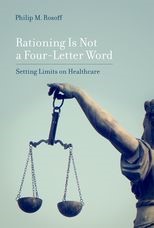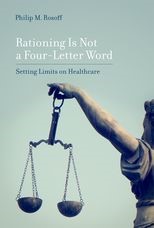Rationing Is Not a Four-Letter Word: Setting Limits on Healthcare
Rationing Is Not a Four-Letter Word: Setting Limits on Healthcare
Cite
Abstract
The healthcare system in the United States is the most expensive in the industrialized world, yet delivers very mediocre outcomes in such measures as equity, infant mortality, and longevity. In addition, a major portion of the American public either lacks health insurance or is underinsured. It is highly unlikely that the Affordable Care Act will do much to reverse the situation, despite decreasing the numbers of uninsured. Costs continue to rise and occupy an increasingly large percentage of GDP. Limiting the amount and kinds of healthcare interventions – rationing - available is both necessary and inevitable to avoid fiscal disaster. This book argues that we already accept draconian and open rationing throughout the health system, such as in organ transplantation. The features that make this and other rationing schemes acceptable are fairness, openness and equality of treatment. Rosoff suggests that combining fair and sensible rationing of interventions that arguably do not offer significant or meaningful benefit, such as intensive care for the dying or expensive chemotherapy for the terminally ill, with institution of a nationalized insurance program offering comprehensive care to all, would not only control costs but fulfil an ethical imperative to the nation’s residents. The book considers the political and structural obstacles to instituting such massive alterations, but ultimately argues that both economic and moral reasons would necessitate these radical changes.
Sign in
Personal account
- Sign in with email/username & password
- Get email alerts
- Save searches
- Purchase content
- Activate your purchase/trial code
Institutional access
-
Sign in through your institution
- Sign in with a library card Sign in with username/password Recommend to your librarian
Institutional account management
Sign in as administratorPurchase
Our books are available by subscription or purchase to libraries and institutions.
Purchasing information| Month: | Total Views: |
|---|---|
| March 2023 | 3 |
| March 2023 | 1 |
| March 2023 | 1 |
| September 2023 | 2 |
| March 2024 | 3 |




Get help with access
Institutional access
Access to content on Oxford Academic is often provided through institutional subscriptions and purchases. If you are a member of an institution with an active account, you may be able to access content in one of the following ways:
IP based access
Typically, access is provided across an institutional network to a range of IP addresses. This authentication occurs automatically, and it is not possible to sign out of an IP authenticated account.
Sign in through your institution
Choose this option to get remote access when outside your institution. Shibboleth/Open Athens technology is used to provide single sign-on between your institution’s website and Oxford Academic.
If your institution is not listed or you cannot sign in to your institution’s website, please contact your librarian or administrator.
Sign in with a library card
Enter your library card number to sign in. If you cannot sign in, please contact your librarian.
Society Members
Society member access to a journal is achieved in one of the following ways:
Sign in through society site
Many societies offer single sign-on between the society website and Oxford Academic. If you see ‘Sign in through society site’ in the sign in pane within a journal:
If you do not have a society account or have forgotten your username or password, please contact your society.
Sign in using a personal account
Some societies use Oxford Academic personal accounts to provide access to their members. See below.
Personal account
A personal account can be used to get email alerts, save searches, purchase content, and activate subscriptions.
Some societies use Oxford Academic personal accounts to provide access to their members.
Viewing your signed in accounts
Click the account icon in the top right to:
Signed in but can't access content
Oxford Academic is home to a wide variety of products. The institutional subscription may not cover the content that you are trying to access. If you believe you should have access to that content, please contact your librarian.
Institutional account management
For librarians and administrators, your personal account also provides access to institutional account management. Here you will find options to view and activate subscriptions, manage institutional settings and access options, access usage statistics, and more.